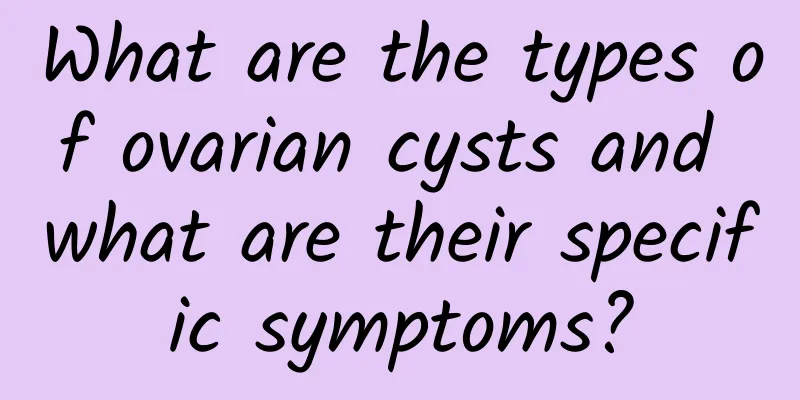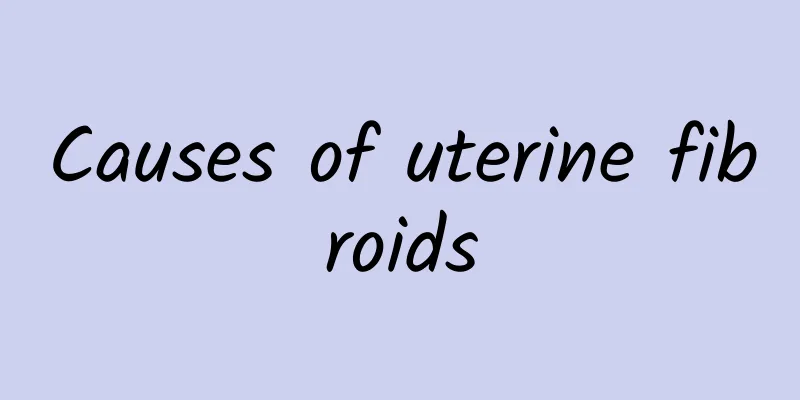What are the types of ovarian cysts and what are their specific symptoms?

|
Ovarian cysts are also a type of gynecological disease, also known as ovarian tumors, and are also a serious disease in the female reproductive organs. So what are the specific symptoms of ovarian cysts? What are the classifications of ovarian cysts? 1. Serous cystadenocarcinoma Ovarian cysts account for about 25% of benign ovarian tumors and are common in patients aged 30 to 40 years. They are mostly unilateral. The symptoms of this type of ovarian cysts are grayish white in appearance, smooth surface, mostly unilocular, thin cyst wall, and light yellow clear and transparent liquid in the cyst. In some cases, papillary protrusions can be seen on the inner wall, clustered or diffuse, which is called papillary serous cystadenoma. The papilla can protrude from the cyst wall, spread and grow on the surface of the cyst, and even invade adjacent organs. For example, patients with ovarian cysts accompanied by ascites have often undergone malignant transformation. 2. Mucinous cystadenoma Ovarian cysts account for about 15-25% of ovarian tumors and are most common in people aged 30-50 years. They are mostly unilateral. The symptoms of ovarian cysts are generally smooth surface, bluish white, multi-chambered, with lotus root starch-like mucus in the cysts. Occasionally, there are papillary protrusions in the cyst wall, which is called papillary mucinous cystadenoma. If the right cyst wall ruptures, tumor cells can be implanted on the peritoneum and the surface of the internal organs, producing a large amount of mucus, which is called peritoneal mucinoma. 3. Mature teratoma ovarian cysts are also called cystic teratomas or dermoid cysts. They account for about 10-20% of ovarian tumors and 97% of teratomas. Most of them occur in childbearing age. The tumors are mostly the size of an adult fist, with a diameter of less than 10 cm, mostly unilateral, and about 25% bilateral. They are round or oval in appearance. The symptoms of ovarian cysts are yellow-white, smooth surface, thick cyst wall, and single-chamber cross-section. The cysts often contain sebum and hair, and teeth, bones, cartilage and nerve tissue can also be seen, and thyroid tissue can occasionally be seen. The above are the specific classification types of ovarian cysts and the specific manifestations of ovarian cyst symptoms. I believe it will be helpful for everyone to understand ovarian cysts. If you have other questions about ovarian cysts, you can contact our online experts. Ovarian cysts http://www..com.cn/fuke/ncnn/ |
<<: What are the specific symptoms of vulvar leukoplakia?
>>: What are the specific symptoms of ovarian cysts?
Recommend
What are the symptoms of acute adnexitis?
Acute adnexitis is a common disease. Do you know ...
Which hospital can check uterine fluid
Which hospital can check uterine effusion? In lif...
What should you pay attention to when taking abortion pills? Pay attention to these 4 points
After taking abortion drugs, women need to keep t...
Are there any sequelae of uterine fibroids? Will they turn into cancer?
Uterine fibroids are generally benign tumors and ...
Gynecologists tell you the causes of ectopic pregnancy
Ectopic pregnancy is a common female disease in l...
Does ovarian cyst cause ovulation? What are the symptoms?
Will ovarian cysts cause ovulation? What are the ...
Some common symptoms of ovarian cysts in the early stage
As a benign tumor, the symptoms of ovarian cysts ...
Common methods of treating endometrial tuberculosis in hospitals
How to correctly treat our endometrial tuberculos...
What are the symptoms of abnormal leucorrhea
Abnormal leucorrhea may be a symptom of a variety...
Pay attention to the little details of your body and be aware of pelvic inflammatory disease in advance
How can you tell if you have acute pelvic inflamm...
Analysis of common clinical vaginitis symptoms
In our lives, it is extremely important to clearl...
What are the causes of dysmenorrhea?
For women, menstruation is essential every month....
2 Diet Tips for Patients with Menstrual Disorders during Menopause
Irregular menstruation is a common gynecological ...
Intrauterine adhesion is one of the complications of abortion
Excessive suction and curettage during abortion c...
Can I play with my phone during confinement after a miscarriage? What are the consequences of playing with my phone during confinement?
Many female friends have had the experience of co...









